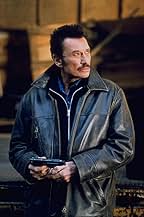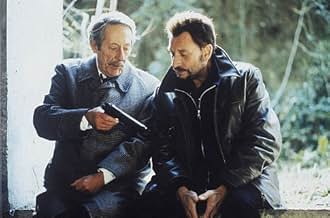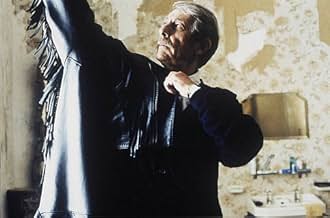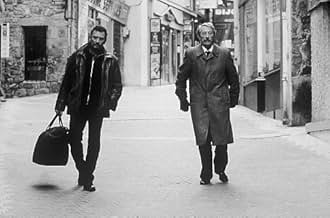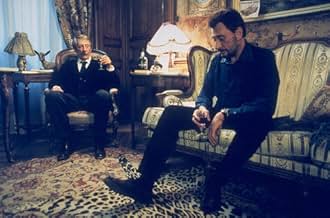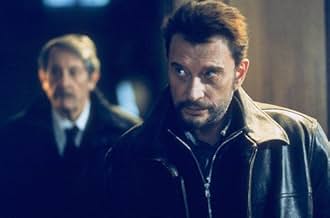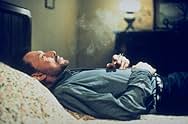CALIFICACIÓN DE IMDb
7.1/10
7.7 k
TU CALIFICACIÓN
Un ladrón de bancos llega para trabajar en un pequeño pueblo francés y entabla amistad con un profesor de poesía jubilado.Un ladrón de bancos llega para trabajar en un pequeño pueblo francés y entabla amistad con un profesor de poesía jubilado.Un ladrón de bancos llega para trabajar en un pequeño pueblo francés y entabla amistad con un profesor de poesía jubilado.
- Dirección
- Guionista
- Elenco
- Premios
- 8 premios ganados y 10 nominaciones en total
- Dirección
- Guionista
- Todo el elenco y el equipo
- Producción, taquilla y más en IMDbPro
Opiniones destacadas
European cinema again; again originality, again stuff almost unique that I'm afraid I'll never find something similar. Here, the story about two people, and those two alone, and it is not easy two keep up ninety minutes developing their experiences. You need to have a good eye, pace, and respect for your characters.
These characters are Milan (Johnny Hallyday), a thief; and Monsieur Manesquier (Jean Rochefort), a retired literature professor. Their differences make their encounters scary. One, an old man who likes to talk and is fascinated by this mysterious obscure man in strange clothes; Manesquier enters Milan's room and imagines to be in a fantasy world he couldn't live in.
Milan is quiet and soft talking, but induces the old man into the drinking again, into excitement and adventures; and after meeting his pals he even doubts about carrying on with the only thing he came to do to this town: rob a bank. He reaches the limit of giving a literature lesson to one of Manesquier's pupils.
The camera is in love with them both, and presents each one in an original way when they are on screen. Different colors, postures, followings. Each one might hide something; there's a past, but that's not what this story that wanders through coincidences and casualties of life wants to show.
A simple aspirin, a glass of water; what can that lead to. The anxiety of a man to be part of something he never lived, on one side. On the other side the silence and intrigue of the little conversation. The glasses of wine, the lunches that seem to say much but are saying almost nothing about the characters.
The music, by Pacscal Estève, is very important to the film; giving to it a touch of Westerns style, playing to represent the state of mind and humor of the characters when we see them, or simply, not playing at all; and that's very good sometimes. Ivan Maussion's production design is also a good point for that matter, with his deserted streets and lonely places.
The screenplay results to be cultured and very intelligent. Patrice Leconte's frequent writing collaborator leaves everything in his character's hands; because the words are his. Also frequently cast by Leconte, Jean Rochefort's delivery is impressing in his measured role, that requires little but well done. It's Johnny Hallyday, however, the one who steals, or shines in his loneliness. With all those looks and his face, always full of hidden things.
Metaphors join us again, in the movie; for us to interpret. I tried, and everyone will, but I say: thank Europe for these movies; it's worth and more a kind of pleasure to watch them!
These characters are Milan (Johnny Hallyday), a thief; and Monsieur Manesquier (Jean Rochefort), a retired literature professor. Their differences make their encounters scary. One, an old man who likes to talk and is fascinated by this mysterious obscure man in strange clothes; Manesquier enters Milan's room and imagines to be in a fantasy world he couldn't live in.
Milan is quiet and soft talking, but induces the old man into the drinking again, into excitement and adventures; and after meeting his pals he even doubts about carrying on with the only thing he came to do to this town: rob a bank. He reaches the limit of giving a literature lesson to one of Manesquier's pupils.
The camera is in love with them both, and presents each one in an original way when they are on screen. Different colors, postures, followings. Each one might hide something; there's a past, but that's not what this story that wanders through coincidences and casualties of life wants to show.
A simple aspirin, a glass of water; what can that lead to. The anxiety of a man to be part of something he never lived, on one side. On the other side the silence and intrigue of the little conversation. The glasses of wine, the lunches that seem to say much but are saying almost nothing about the characters.
The music, by Pacscal Estève, is very important to the film; giving to it a touch of Westerns style, playing to represent the state of mind and humor of the characters when we see them, or simply, not playing at all; and that's very good sometimes. Ivan Maussion's production design is also a good point for that matter, with his deserted streets and lonely places.
The screenplay results to be cultured and very intelligent. Patrice Leconte's frequent writing collaborator leaves everything in his character's hands; because the words are his. Also frequently cast by Leconte, Jean Rochefort's delivery is impressing in his measured role, that requires little but well done. It's Johnny Hallyday, however, the one who steals, or shines in his loneliness. With all those looks and his face, always full of hidden things.
Metaphors join us again, in the movie; for us to interpret. I tried, and everyone will, but I say: thank Europe for these movies; it's worth and more a kind of pleasure to watch them!
"Man on the Train (L'Homme du train)" is a small story of cumulative details done exceedingly well that could simply not be done by Hollywood.
The excellent leads, each charismatic in his own way, talky Jean Rochefort and taciturn Johnny Hallyday (who brings none of his pop star baggage to an American audience), are past middle age. There is a lot of Rohmer-like sitting around talking over a bottle of wine.
The emphasis is on very gradual, internal realizations by each character that are revealed by a subtle accretion of surprising little decisions, such as wearing slippers or getting a new haircut, culminating in an unpredictable, yet beautifully satisfying conclusion.
Photographed in a shades of gray palette that is almost in black-and-white, a small town and its interconnections and personalities are beautifully evoked.
The women in their lives are ancillary, which is just as well, as they are not completely believable.
The poetry teacher is too sophisticated to quote John Greenleaf Whittier, but I will, on the theme: "Of all the words of tongue or pen/the saddest are these/It might have been."
The excellent leads, each charismatic in his own way, talky Jean Rochefort and taciturn Johnny Hallyday (who brings none of his pop star baggage to an American audience), are past middle age. There is a lot of Rohmer-like sitting around talking over a bottle of wine.
The emphasis is on very gradual, internal realizations by each character that are revealed by a subtle accretion of surprising little decisions, such as wearing slippers or getting a new haircut, culminating in an unpredictable, yet beautifully satisfying conclusion.
Photographed in a shades of gray palette that is almost in black-and-white, a small town and its interconnections and personalities are beautifully evoked.
The women in their lives are ancillary, which is just as well, as they are not completely believable.
The poetry teacher is too sophisticated to quote John Greenleaf Whittier, but I will, on the theme: "Of all the words of tongue or pen/the saddest are these/It might have been."
1st watched 8/9/2003 - 7 out of 10(Dir-Patrice Leconte): Wonderful drama about two men who want to switch places in life because each is bored of what their life has become. One is a bank robber, and the other is a retired poetry teacher. The bank robber is plain tired of the excitement and the other wants excitement in his life. The retired poetry teacher also has an upcoming triple-bypass heart surgery that lends to his aggressiveness about trying out the other lifestyle. Like many French dramas, this movie takes it's time and explores the characters and let's us get to know them. This is `so' lacking in most American films these days and therefore this is a breath of fresh air for those who are okay with reading subtitles. While watching this movie you get the feeling that you're watching two `real' people interacting despite their differences. Do they ever switch places? Well, sort of but like other French dramas `reality' is where the film stays for the most part. The ability for the characters to understand and accept each other is `just' wonderful and makes a wonderful statement about how we should `all' interact and I think this is what makes this film remarkable.
This is a beautifully acted and written story of two older men dealing with regret. The dialogue is witty, but never self-conscious and the performances are great. Johnny Hallyday (The Elvis of France!) is especially surprising in his role as the bank robber at the end of his career.
The story is well paced, and unlike a lot of French movies, it's not just a bunch of talking heads, but a real story with compelling characters. The two strangers meet by hazard and forge a close relationship, each trading bits and pieces of their lives. The scene where Jean Roquefort gives Johnny his slippers is a literal manifestation of their efforts to change their lives, albeit late in life.
A lovely little film from beginning to end!
The story is well paced, and unlike a lot of French movies, it's not just a bunch of talking heads, but a real story with compelling characters. The two strangers meet by hazard and forge a close relationship, each trading bits and pieces of their lives. The scene where Jean Roquefort gives Johnny his slippers is a literal manifestation of their efforts to change their lives, albeit late in life.
A lovely little film from beginning to end!
This movie must be seen! Too many people think about French films as too slow, boring and too "intellectual". L'Homme du Train is the opposite: ironic, funny without being obvious or foreseen. Two protagonists and a director: a perfect alchemy between the three.
Leconte uses the camera "inside" the characters, Rochefort and Hallyday are superb in their roles. Moreover everyone can identify with one of the two: everyone dreamt at least once to be someone else! Leconte makes the dream true!
Leconte uses the camera "inside" the characters, Rochefort and Hallyday are superb in their roles. Moreover everyone can identify with one of the two: everyone dreamt at least once to be someone else! Leconte makes the dream true!
¿Sabías que…?
- TriviaJean Rochefort died in October 2017. Two months later, Johnny Hallyday died.
- ConexionesReferenced in 69 minutes sans chichis: Johnny Hallyday (2015)
- Bandas sonorasImpromptu in A-flat Major, Op. 142 No. 2 (D. 935)
Written by Franz Schubert
Selecciones populares
Inicia sesión para calificar y agrega a la lista de videos para obtener recomendaciones personalizadas
- How long is Man on the Train?Con tecnología de Alexa
Detalles
- Fecha de lanzamiento
- Países de origen
- Sitio oficial
- Idioma
- También se conoce como
- Man on the Train
- Locaciones de filmación
- Productoras
- Ver más créditos de la compañía en IMDbPro
Taquilla
- Total en EE. UU. y Canadá
- USD 2,542,020
- Fin de semana de estreno en EE. UU. y Canadá
- USD 41,138
- 11 may 2003
- Total a nivel mundial
- USD 7,727,906
- Tiempo de ejecución
- 1h 30min(90 min)
- Color
- Mezcla de sonido
- Relación de aspecto
- 2.35 : 1
Contribuir a esta página
Sugiere una edición o agrega el contenido que falta


